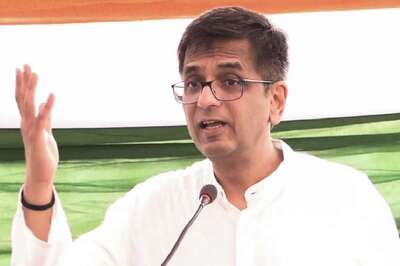
views
LONDON:British Prime Minister Rishi Sunak on Wednesday called an election, naming July 4 as the date for a vote his governing Conservatives are widely expected to lose to the opposition Labour Party after 14 years in power.
An election has been widely anticipated this year although October or November had been seen as the most likely timing by most pundits.
Keir Starmer’s Labour Party has held an around 20 point lead in opinion polls since late 2021, before Sunak took office in October 2022 and following the scandal-ridden premiership of Boris Johnson and the upheaval of Liz Truss’s 49-day tenure.
MARKET REACTION:
FOREX: Sterling held onto its gains and was last up almost 0.3% on the day at $1.2745, marginally above levels seen before Sunak started speaking outside his Downing Street residence.
STOCKS: Futures on the FTSE 100 stock index were down 0.7%. They had traded down 0.6% earlier in the day.
The FTSE stock index closed down 0.6%
BONDS: Britain’s bond market was closed when the election announcement was made. The 10-year government bond yield had risen earlier in the day on latest inflation numbers.
COMMENTS:
SUSANNAH STREETER, HEAD OF MONEY AND MARKETS, HARGREAVES LANSDOWN, LONDON:
“Until we see the detail in the manifestos it’s difficult to analyse specific effects on sectors of the economy. There are some broadbrush indications in Labour’s pledges which may weigh on or benefit certain industries.
“The pledge to kickstart the building of 1.5 million new homes by shaking up the planning system and fast-tracking urban brownfield sites for development would benefit the housebuilders who have had to deal with weaker demand in an era of high interest rates and slow approvals of new sites.”
“Labour intends to set up Great British Energy, a publicly owned clean power firm, with the running costs to be paid through increasing the windfall tax on oil and gas company profits from the North Sea.
“A levy specifically on oil and gas in the North Sea is also likely to affect smaller companies rather than larger energy giants, given that they have less capacity to absorb tax changes, and it may lead to fewer contracts being clinched in the supply chain because of this.”
FRANCESCO PESOLE, FX STRATEGIST, ING, LONDON:
“I don’t think it will have an impact on markets. The last time UK politics had any material impact on the pound outside budget announcements was when there was Liz Truss – and that was related to the budget too, outside of that it was the Brexit discussions.
“Sterling now is trading almost entirely on the back of monetary policy in the UK and the U.S., so the question we should be asking ourselves is ‘will the election have any clear implications for Bank of England timing for rate cuts?’ and we don’t think so. The Bank of England has done quite a lot to reinforce its independence.
“If could have been a tricker one if inflation today had come in lower – the important bit was services inflation which was still too high – as the chance of a rate cut in June has declined.”
JANE FOLEY, HEAD OF FX STRATEGY, RABOBANK, LONDON:
“Clearly, Sunak is hoping that the element of surprise will go in his favour, particularly, on the back of the better inflation data today. But I don’t think markets are going to be particularly moved by this.
“It doesn’t change the fact that the Labour Party is 20 points ahead in the polls. And it doesn’t change the fact that the market is actually a little bit disappointed with inflation data today.
“The market is fairly confident there’s going to be a Labour government and it’s pretty confident also that the Labour government won’t be that different in terms of fiscal policy, than the current Sunak and Hunt mix anyway.
“The current lineup in the Labour front bench is very different to what we would have had in the Corbyn days. We’ve seen Rachel Reeves and the whole of the front bench, trying to woo business investors. There is this impression that given the tightness of the fiscal position that (Labour’s Rachel) Reeves understands that business investment is going to be crucial if the economy is going to see better growth.”
MICHAEL METCALFE, HEAD OF MACRO STRATEGY, STATE STREET, LONDON:
“Before today, this would have been assumed to be a bit earlier than expected and it’s been interesting to see how markets traded as rumours built during the day.
“Elections always brings some uncertainty for markets and that can be uncomfortable.
“But the outcome, according to polls, doesn’t seem to be in doubt, and that might help explain the calm market reaction.
“It doesn’t look like there are major policy shifts that are in the policy programs that could disrupt markets.
“We have known election uncertainty would hang over markets and now have that certainty.
“The better news on inflation might be one reason why they bought the election date forward.
“By bringing forward the election day, we get over the hump of elections, but because inflation didn’t fall as fast as anticipated, markets are going to be left with interest rate uncertainty for longer.”
BEN LAIDLER, GLOBAL MARKETS STRATEGIST, ETORO, LONDON:
“My analogy is Labour in 1997. That’s the parallel. You had a centrist Labour party with a big poll lead and an exhausted incumbent Conservative party.”
“Basically markets just rallied straight through that. There wasn’t a lot of policy change on the table and there wasn’t a lot of election uncertainty.”
“(There is) a lack of policy divergence between the two, frankly … I would expect this nascent rally to continue, or at least not be derailed.”
“The proximate catalyst (of the rally) is this combination of interest rate cuts are coming, growth is firming, and stocks are cheap.”
NICHOLAS REES, FX ANALYST, MONEX EUROPE, LONDON:
“Right now, the big thing for sterling is, you’re going to see a large stable majority.”
“Markets really are just looking for stability and certainty, from any government coming in and right now it looks like we are going to get a relatively moderate Labour government that is going to pursue relatively market friendly borrowing policies and markets are looking at it and going ‘thank goodness’.”
“The current polling is around the sweet spot for sterling. If Labour were to give up another 5 to 10 points to the Conservatives, markets would get a little bit jittery about the size of their majority. If they gain another 5 to 10 percentage points then that becomes a Conservative extinction event, and then any opposition will come from the left wing of the Labour party and that will be a worry for markets.”
NEIL JONES, SENIOR FX SALES TO SENIOR FINANCIAL INSTITUTIONS, TJM Europe, LONDON:
“Currencies like political certainty and the pound is no exception. An election generates unknown variables and moving parts.”
“There is very heavy focus on the BoE and the dollar right now and that will remain key, we’ve just added another layer of significance into the mix for the pound.”
Disclaimer: This post has been auto-published from an agency feed without any modifications to the text and has not been reviewed by an editor
Stay informed with the Iranian President News Latest Updates..




















Comments
0 comment